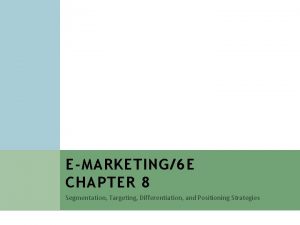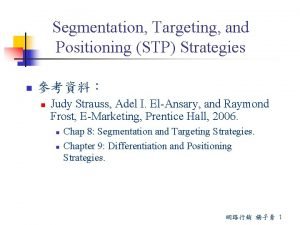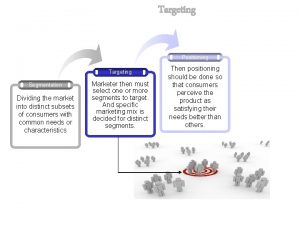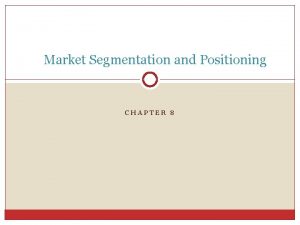Market Segmentation Targeting and Positioning Waleed Khan Afridi

















- Slides: 17

Market Segmentation, Targeting, and Positioning Waleed Khan Afridi Mr. Afridi, Kabul Institute, Kabul MS-Leading to Ph. D Member SDPI, South Asia 1 Member PJMS

Overview of Market Segments and Target Markets • Market Segments: Groups of customers with different wants, needs, behaviors in a market are called market segments. • Target Market: A specific Market Segment of (customers or organizations) for which the seller designs specific promotional activities is called as Target Market. • Market Segmentation: A process of dividing the total market for a good or service into small, same groups. Mr. Afridi, Kabul Institute, Kabul 2

Benefits of Market Segmentation • Customers with similar wants, needs and characteristics can be focused. • It is easy to design promotional activities for a specific segment. • By targeting a specific segment, much investment can be saved. • It is easy to manage a specific segment of market. Mr. Afridi, Kabul Institute, Kabul 3

Process of Market Segmentation • Intuition based on experience and judgment. • Copying competitors and earlier market entrants. • Process Steps: • Identify the wants and needs of the customers which are not satisfied in a market. • Identifying the characteristics that distinguish segments (age, gender, likes and dislikes). • Identify the size of the segments and estimate demand for the product (Sales). Estimate Demand for products Identify Needs Identify Characteristics Market Segmentation Process Mr. Afridi, Kabul Institute, Kabul 4

Ultimate Consumer and Business Consumers • Ultimate consumers who buy goods or services for their own personal or household use. • Business users who buy goods or services to use in their businesses, to make other products, or to resell to other business users or consumers. Mr. Afridi, Kabul Institute, Kabul 5

CONSUMER MARKETS ARE COMMONLY FURTHER SEGMENTED ON THE BASIS OF: • Geography • Demographics • Psychographics Mr. Afridi, Kabul Institute, Kabul 6

Segmentation basis Typical market segments • • Geographic: Region • • • Demographic: Income City Population Urban-rural Climate Age Gender Family life cycle Social class New England, Middle Atlantic, and other census regions Under 25, 000; 25, 001 -100, 000; 100, 001500, 000; 500, 001 -1, 000; etc. Urban, suburban, rural Hot, cold, sunny, rainy, cloudy Under $10, 000; $10, 001 -$25, 000; $25, 001$35, 000; $35, 001 -$50, 000; over $50, 000 Under 6, 6 -12, 13 -19, 20 -34, 35 -49, 50 -64, 65 and over Male, female Young, single; young, married, no children, etc. Upper class, upper middle, lower middle, upper lower, etc Mr. Afridi, Kabul Institute, Kabul 7

Segmentation basis Typical market segments (cont. ) • • • Demographic (cont. ): Education Grade school only, high school graduate, college graduate Occupation Professional, manager, clerical, sales, student, homemaker, unemployed Ethnic background African, Asian, European, Hispanic, Middle Eastern, etc. • • • Psychographic: Personality Life-style Values Ambitious, self-confident, aggressive, introverted, extroverted, sociable Activities (golf, travel); interests (politics, art); opinions (conservation, capitalism) Values and Life-Styles Mr. Afridi, Kabul Institute, Kabul 8

GEOGRAPHIC SEGMENTATION • Regional distribution because people within a given region tend to share the same values attitudes and style preferences. • Urban, suburban, and rural distribution. Mr. Afridi, Kabul Institute, Kabul 9

Geographic Segmentation (Example) • Nestle Mineral Water Company, in Pakistan decided to divide the Karachi Market (Capital City of Sind Province) into segments on the basis of Geography , and Geographic Segmentation was done. Karachi Market was divided into Rural, Urban and Sub-Urban Areas. Individuals needs and wants of clean drinking water were identified in Urban Areas, Rural Areas and Sub Urban Areas. Individuals living in those areas wanted clean drinking water plants in their local areas. According to the needs and wants of the consumers living in Rural Areas, Urban Areas and Sub-urban areas, clean drinking water plants (Mini-size) were established in the locales (Streets) etc. Mr. Afridi, Kabul Institute, Kabul 10

DEMOGRAPHIC SEGMENTATION Age, Gender, Education etc • Age • Social class: A measure made up of a combination of characteristics such as level of education, occupation, and the type of neighborhood one lives in. • Ethnicity Mr. Afridi, Kabul Institute, Kabul 11

Demographic Segmentation (Example) • Dolce and Gabbana a US Canvas firm, decided to segment the market of South Carolina on the basis of Demographic characteristics and those consumers who’s ethnicity belonged to Africa were targeted, meaning that they focused Black consumers. D&G decided to produce Black Jeans Paints as the black Jeans were not available in the markets and they were according to the need and wants of Black Consumers (American African). Mr. Afridi, Kabul Institute, Kabul 12

PSYCHOGRAPHIC SEGMENTATION HOW A PERSON THINKS, FEELS, AND BEHAVES. • Personality characteristics. • Lifestyles, including activities, interests, and opinions. • Values, are principles of society that are acceptable to the society members. Mr. Afridi, Kabul Institute, Kabul 13

Psychographic Segmentation (Example) • Arctic engineers, the producers of Gymtronics (Weight reducing device), decided to segment the market of California State of USA on the basis of Life Style characteristics of Consumers. In this way the needs of consumers were identified who were over weight and wanted to reduce weight to enhance their lifestyles activities. Gymtronics guaranteed weight loss and thus Psychographic Segmentation was done. Mr. Afridi, Kabul Institute, Kabul 14

Target Market Strategies A Process of focusing a specific market segment by shifting all promotional activities to that segment. Targeting includes advertising, personal selling and direct marketing. • Market aggregation—treat the total market as a single segment. Kabul City is a total market for ACER Computers. • Single-segment concentration —focus on one segment. ACER Computers has targeted a segment of Foreigners as they have money and are rich. • Multiple-segmentation —select two or more segments and devise different marketing mixes for each. ACER Computers have targeted Foreigners and those who work in offices, mean Officer Workers. Mr. Afridi, Kabul Institute, Kabul 15

Thank you very much for your time! • Mr. Afridi (waleedafr@yahoo. com) • Please send you feedback through email. Keep Smiling Please…. . ! Mr. Afridi, Kabul Institute, Kabul 16

Disclaimer • It is to notify that these slides have been made with the help of the Text Books and Reference Books that are permitted by the Preston University, USA (www. preston. edu) and the Kardan University (An affiliate of Preston USA), Kabul, Afghanistan. The students/users are advised to use the slides without any doubt and fear of getting falsified knowledge. In case of any doubt or problem the Mr. Afridi may please be contacted. • Recommended Books: • Marketing (Concepts and Cases) Thirteen Edition/Special Indian Edition (LPE) by Etzel, Walker, Stanton and Pandit, Mc. Graw Hill Publishers. • Principles of Marketing, (LPE) Twelfth Edition by Philip Kotler and Gary Armstrong, Pearson Education Publishers.
 Requirements for effective segmentation
Requirements for effective segmentation Sony market segmentation, targeting and positioning
Sony market segmentation, targeting and positioning Https://www.census.gov/popclock/
Https://www.census.gov/popclock/ Nokia market segmentation targeting and positioning
Nokia market segmentation targeting and positioning Market segmentation, targeting and positioning
Market segmentation, targeting and positioning Benefits sought segmentation
Benefits sought segmentation Concentrated marketing
Concentrated marketing Nivea positioning statement
Nivea positioning statement Segmentation targeting differentiation and positioning
Segmentation targeting differentiation and positioning Nivea positioning
Nivea positioning Global market segmentation
Global market segmentation Market segmentation process
Market segmentation process Stp of maruti suzuki
Stp of maruti suzuki Segmentation
Segmentation Segmentation targeting and positioning
Segmentation targeting and positioning Global segmentation strategy
Global segmentation strategy Global segmentation and positioning
Global segmentation and positioning Segmentation vs targeting
Segmentation vs targeting
































